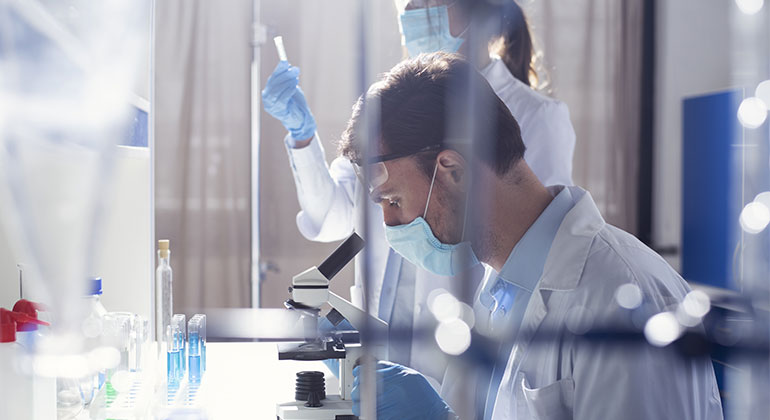Mount Sinai and Rumi Scientific Team Up to Advance Drug Discovery for Rare Genetic Disorders Tied to Autism

The Seaver Autism Center for Research and Treatment at the Icahn School of Medicine at Mount Sinai and Rumi Scientific announced today that they will team up to initiate a drug discovery pipeline for rare genetic disorders that carry a high risk of autism. The project will initially involve the development and use of a platform that mimics the development of brain tissues, at high speed, allowing researchers to gain insights into how cells respond to three known genes implicated in autism.
“Over the past several years, more than 100 genes have been identified that confer very high risk to autism when mutated, and the Seaver Center at Mount Sinai is one of the lead sites for these autism gene discoveries,” said Joseph D. Buxbaum, PhD, Director of the Seaver Autism Center for Research and Treatment at Mount Sinai and Professor of Psychiatry, Neuroscience, and Genetics and Genomic Sciences at the Icahn School of Medicine at Mount Sinai. “We are eager to work together with Rumi Scientific, using their outstanding proprietary technology, to build a drug discovery pipeline for these monogenic causes of autism, with the ultimate goal of identifying lead therapeutic candidates that can be evaluated clinically.”
Rumi Scientific’s cutting-edge phenotypic platform mimics the development of human brain tissues, at high speed, using a proprietary technique to create highly reproducible organoids—tiny, self-organized tissue cultures that are derived from induced pluripotent stem cells (iPSCs), which can be crafted to replicate an organ or to express selected aspects like genetic mutations. The Rumi system incorporates sensitive machine-learning algorithms, helping to very precisely identify effects on a cell, thus predicting the therapeutic effect a drug could have on a human’s diseased brain tissues. This advanced technology allows for an unprecedented ability to identify and quantify differences between diseased and healthy cells. Uniquely, Rumi’s organoids focus on early development phenotypic signatures (how the gene mutation leads to disease), and since a large portion of autism genes are active even early in development, these tissue cultures present interesting possibilities for drug screening.
Initially, Mount Sinai’s Seaver Center will provide iPSCs for three autism genes—ADNP, DDX3X, and FOXP1—and Rumi Scientific will probe the existence of phenotypic signatures associated with these genetic mutations using its proprietary organoid technology. The aim of creating a model platform for each of the three genes of interest is to allow translation of these proof-of-concept experiments into a robust high-throughput screening platform across which thousands of therapeutic compounds can be efficiently tested.
“We are very excited to be working with the world-class team at the Seaver Autism Center on their visionary approach to finding cures for autism. To date, no one has evaluated how specific autism mutations affect neural organization in a human context and at the level of a tissue; this collaboration creates the opportunity to discover robust phenotypic signatures which in turn could lead to valuable therapeutic possibilities” said Ilona Nemeth, Chief Executive Officer of Rumi Scientific.
About Rumi Scientific
Founded in 2016 on technology initially conceived at Rockefeller University, Rumi Scientific's mission is to revolutionize drug discovery, using synthetic human tissue to produce more predictive data leading to a safe and faster clinical trial process. Rumi Scientific's technology is a powerful engine for the discovery of new drugs to cure genetic diseases. Rumi's headquarters and laboratories are located in New York City. For more information on Rumi Scientific, please see www.rumiscientific.com or contact info@rumiscientific.com.
About the Mount Sinai Health System
Mount Sinai Health System is one of the largest academic medical systems in the New York metro area, with 48,000 employees working across seven hospitals, more than 400 outpatient practices, more than 600 research and clinical labs, a school of nursing, and a leading school of medicine and graduate education. Mount Sinai advances health for all people, everywhere, by taking on the most complex health care challenges of our time—discovering and applying new scientific learning and knowledge; developing safer, more effective treatments; educating the next generation of medical leaders and innovators; and supporting local communities by delivering high-quality care to all who need it.
Through the integration of its hospitals, labs, and schools, Mount Sinai offers comprehensive health care solutions from birth through geriatrics, leveraging innovative approaches such as artificial intelligence and informatics while keeping patients’ medical and emotional needs at the center of all treatment. The Health System includes approximately 9,000 primary and specialty care physicians and 11 free-standing joint-venture centers throughout the five boroughs of New York City, Westchester, Long Island, and Florida. Hospitals within the System are consistently ranked by Newsweek’s® “The World’s Best Smart Hospitals, Best in State Hospitals, World Best Hospitals and Best Specialty Hospitals” and by U.S. News & World Report's® “Best Hospitals” and “Best Children’s Hospitals.” The Mount Sinai Hospital is on the U.S. News & World Report® “Best Hospitals” Honor Roll for 2024-2025.
For more information, visit https://www.mountsinai.org or find Mount Sinai on Facebook, Instagram, LinkedIn, X, and YouTube.